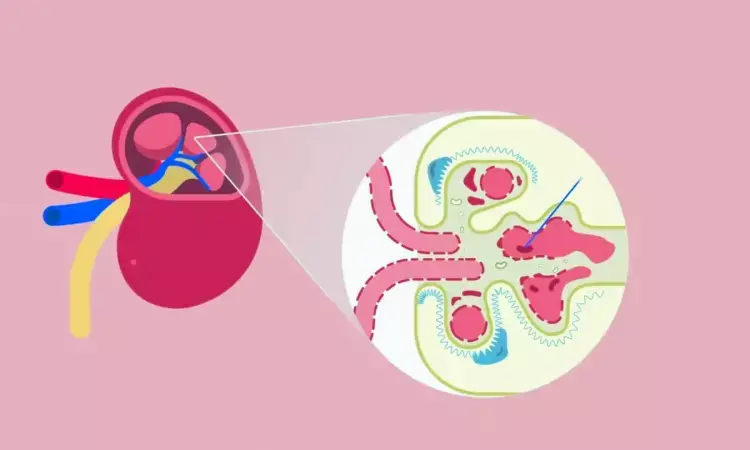- Home
- Medical news & Guidelines
- Anesthesiology
- Cardiology and CTVS
- Critical Care
- Dentistry
- Dermatology
- Diabetes and Endocrinology
- ENT
- Gastroenterology
- Medicine
- Nephrology
- Neurology
- Obstretics-Gynaecology
- Oncology
- Ophthalmology
- Orthopaedics
- Pediatrics-Neonatology
- Psychiatry
- Pulmonology
- Radiology
- Surgery
- Urology
- Laboratory Medicine
- Diet
- Nursing
- Paramedical
- Physiotherapy
- Health news
- Fact Check
- Bone Health Fact Check
- Brain Health Fact Check
- Cancer Related Fact Check
- Child Care Fact Check
- Dental and oral health fact check
- Diabetes and metabolic health fact check
- Diet and Nutrition Fact Check
- Eye and ENT Care Fact Check
- Fitness fact check
- Gut health fact check
- Heart health fact check
- Kidney health fact check
- Medical education fact check
- Men's health fact check
- Respiratory fact check
- Skin and hair care fact check
- Vaccine and Immunization fact check
- Women's health fact check
- AYUSH
- State News
- Andaman and Nicobar Islands
- Andhra Pradesh
- Arunachal Pradesh
- Assam
- Bihar
- Chandigarh
- Chattisgarh
- Dadra and Nagar Haveli
- Daman and Diu
- Delhi
- Goa
- Gujarat
- Haryana
- Himachal Pradesh
- Jammu & Kashmir
- Jharkhand
- Karnataka
- Kerala
- Ladakh
- Lakshadweep
- Madhya Pradesh
- Maharashtra
- Manipur
- Meghalaya
- Mizoram
- Nagaland
- Odisha
- Puducherry
- Punjab
- Rajasthan
- Sikkim
- Tamil Nadu
- Telangana
- Tripura
- Uttar Pradesh
- Uttrakhand
- West Bengal
- Medical Education
- Industry
Telitacicept Effectively Reduces Proteinuria in IgA Nephropathy with Safe Tolerability: Study

China: Telitacicept significantly reduced proteinuria in patients with IgA nephropathy, while maintaining an acceptable safety profile comparable to that of standard treatments, offering a potential new therapeutic option, suggests a recent study.
The study published in BMC Nephrology by Hui Li and colleagues from the Department of Nephrology, Xin Hua Hospital, affiliated with Shanghai Jiao Tong University School of Medicine, evaluated the real-world effectiveness and safety of telitacicept in individuals with IgA nephropathy (IgAN). The research aimed to provide practical evidence regarding the clinical benefits of this dual B-cell activating factor (BAFF) and a proliferation-inducing ligand (APRIL) inhibitor in managing IgAN.
The retrospective, single-center study included 33 patients diagnosed with IgA nephropathy. Among them, 11 patients received telitacicept for at least three months, while a control group was established through propensity score matching to ensure comparability. Clinical and laboratory assessments were performed at baseline and then every 1 to 3 months during the 6-month follow-up period.
The key findings of the study were as follows:
- After three months of treatment, patients receiving telitacicept showed a significant reduction in 24-hour urinary protein levels, with a mean decrease of about 893 mg/day (63.9%).
- The telitacicept group achieved complete remission in 36.36% of patients and partial remission in another 36.36%.
- In the control group, complete remission was seen in 31.82% and partial remission in 36.36%, suggesting comparable or slightly better outcomes with telitacicept in a shorter duration.
- At six months, the telitacicept group continued to exhibit lower 24-hour urinary protein levels compared to the control group [381.68 mg/day vs. 480.15 mg/day], though the difference was not statistically significant.
- The complete remission rate increased to 54.55% in the telitacicept group, while the control group showed 36.36%.
- Overall remission was recorded in 72.73% of the telitacicept group and 77.27% of the control group.
- Serum creatinine and estimated glomerular filtration rate (eGFR) remained stable in both groups throughout the six-month study period.
- Telitacicept demonstrated a favorable safety profile, with the most common side effects being mild local reactions such as pain, redness, or itching at the injection site.
- No severe or unexpected adverse events were reported during the follow-up period.
The investigators acknowledged several limitations, including the small sample size, relatively short follow-up duration, and incomplete post-treatment data for immunological markers such as IgA and Gd-IgA. Additionally, potential racial differences and variations in treatment regimens may have influenced the results. The researchers emphasized the need for large-scale, multicenter randomized controlled trials with longer follow-up and standardized treatment protocols to confirm these findings and evaluate the cost-effectiveness of telitacicept.
"The study supports the therapeutic potential of telitacicept as an effective and safe treatment option for patients with IgA nephropathy. While preliminary, these findings highlight telitacicept’s promise as an alternative approach for reducing proteinuria and preserving kidney function in IgAN management," the authors concluded.
Reference:
Li, H., Zhang, Y. & Zhang, C. Effectiveness and safety of telitacicept in IgA nephropathy: a propensity score matching analysis with a 6-month follow-up. BMC Nephrol 26, 546 (2025). https://doi.org/10.1186/s12882-025-04468-7
Dr Kamal Kant Kohli-MBBS, DTCD- a chest specialist with more than 30 years of practice and a flair for writing clinical articles, Dr Kamal Kant Kohli joined Medical Dialogues as a Chief Editor of Medical News. Besides writing articles, as an editor, he proofreads and verifies all the medical content published on Medical Dialogues including those coming from journals, studies,medical conferences,guidelines etc. Email: drkohli@medicaldialogues.in. Contact no. 011-43720751
Next Story


